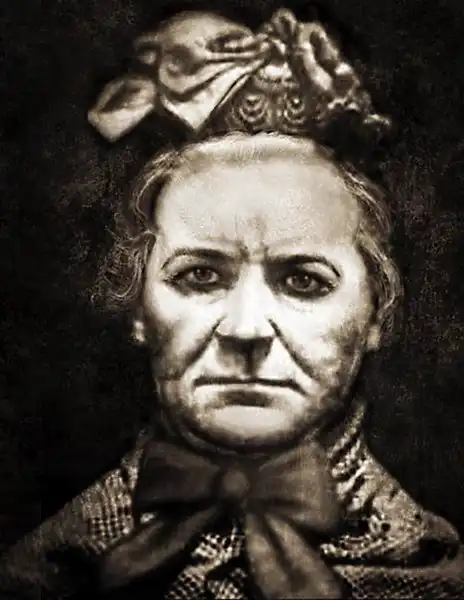Amelia Dyer The Untold Story of the Most Famous Women Serial Killer
Amelia Dyer was an English serial killer who rose to prominence for the murder of infants in the late 19th century. Her horrific crimes are said to have resulted in the deaths of hundreds of infants entrusted to her care. She is regarded as one of history’s most prolific female serial killers.
Who is Amelia Dyer?
Amelia Dyer was born in Bristol, England, in 1837. Amelia was the youngest of five children, and her parents were both from the working class. Her mother was a dressmaker, while her father was a renowned shoemaker. It is believed that this era in her life was terrible, and she may have faced abuse.
Amelia married George Thomas, a 59-year-old man, when she was 24. They had one daughter before George died a year after their marriage. Amelia subsequently turned to baby farming as a means of income. Baby farming was a practice where mothers would accept unwanted kids and care for them for a price. This was a widespread practice at the time, but many baby farmers were cruel and negligent, resulting in the deaths of many infants.
The Nursing Career of Amelia Dryer
Amelia Dyer is well-known for her baby farming and serial murder, but she also worked as a nurse before becoming a criminal. She studied as a nurse at Bristol Royal Infirmary in the mid-1860s and worked there briefly. She subsequently worked as a private nurse, providing care to patients in their homes.
Throughout her nursing profession, Amelia was recognized for being compassionate and kind to her patients. She was frequently lauded for her compassion and commitment to her profession. Her nursing work, however, is said to have contributed to her ultimate plunge into criminal activities.
As a private nurse, Amelia would have been in charge of providing drugs and caring for critically ill patients. Unfortunately, it is possible that her job desensitized her to death and disease, making it easier for her to hurt the infants in her care in the future.
It’s also likely that Amelia’s nursing profession gave her the information and abilities she needed to commit her crimes. For example, she may have been aware of how to give medications and other treatments that would cause the infants in her care to die, and she may have been able to conceal her crimes by claiming that the deaths were due to natural reasons.

Ultimately, while Amelia Dyer’s nursing career was brief, it may have contributed to her eventual plunge into criminal activities. Her training and experience as a nurse may have provided her with the knowledge and abilities necessary to commit her heinous crimes while potentially acclimating her to the agony of her victims.
Amelia Dryer and Her Baby Farms
Amelia Dyer started her baby farming business in the early 1870s. She advertised in local publications, offering to take in infants for a charge. She quickly established a reputation as a dependable and trustworthy caretaker, which resulted in a consistent inflow of clients. Nevertheless, it was eventually revealed that she was ignoring the children in her care, causing them to die of malnutrition and neglect.
After the death of a newborn in her care in 1879, Amelia was arrested and charged with negligence and she was sentenced to six months in prison, but following her release, she continued to run her baby farming company. For the following several years, there were other complaints of child fatalities related to Amelia’s care, but she avoided punishment due to a lack of proof.
How Did Amelia Dyer Get Caught?
Amelia Dyer was apprehended after a suspicious nurse named Ellen Dane discovered one of her parcels. Amelia had sent a packet to Ellen Dane in 1896 containing the body of a baby girl. The package was wrapped in brown paper, secured with thread, and filled with bricks. Amelia had scribbled the address and name of “Mrs. Thomas” – one of her many aliases – on the outside.
Ellen Dane worked as a nurse in a nursing home in Southsea, Hampshire. She had seen Amelia’s adverts in local publications, so she was familiar with her name. Dane got skeptical of the package after feeling something hefty and odd within. She chose to open it and was shocked to see the newborn girl’s body inside.
Dane immediately phoned the police, who could trace the package back to Amelia. The authorities learned that Amelia had delivered identical packages to other women who had given birth out of wedlock and had paid her to adopt their children. Six corpses were discovered at Amelia’s Reading, Berkshire house.
Amelia was taken into custody and accused of murder. During her trial, she admitted to murdering up to 400 newborns over the course of many years. Amelia was found guilty and condemned to death by hanging. On June 10, 1896, she was executed at Newgate Prison.
The revelation of Amelia’s crimes provoked a public outcry and widespread anger. It also resulted in legal improvements to help safeguard children, particularly those in the care of others. Nevertheless, Amelia Dyer committed some of the most terrible crimes in history, and they continue to intrigue and horrify people to this day.
While Amelia is most known for her crimes as a baby breeder, she had a criminal background before her involvement in the baby farming enterprise. In 1869, she was convicted of stealing and sentenced to six months in jail; in 1879, she was convicted of receiving stolen goods and sentenced to another six months in prison.
Amelia Dyer is known to have utilized names such as “Mrs. Harding,” “Mrs. Thomas,” and “Mrs. Palmer” during her criminal career. In addition, she would use these names when advertising for infants to adopt or when interacting with other baby farms or agencies.

The Trial
Amelia Dyer was accused of the murder of Doris Marmon, a baby girl whose body was discovered in the River Thames, during her trial at the Old Bailey in London in May 1896. While she was only charged with one murder, the evidence showed she may have been responsible for the deaths of many additional infants.
Amelia first pled not guilty at the trial but then altered her plea to guilty. She admits to murdering the infant and dumping her body in the river. She also acknowledged killing numerous additional infants over several years, though the actual number remained unknown.
Amelia remained cool and controlled throughout the trial, never displaying emotion or sorrow for her crimes. She would then abandon the infants, frequently failing to feed or care for them adequately until they perished of famine or sickness.
Amelia’s defense attempted to establish that she was not of sound mind and was suffering from postpartum depression, but this case failed. Instead, the prosecution said Amelia committed her crimes for financial gain and showed neither sympathy nor compassion for her victims.
The trial lasted only one day, and the jury barely took four and a half minutes to convict Amelia. Nevertheless, she was sentenced to death by hanging, and her execution occurred on June 10, 1896, at Newgate Prison.
Amelia Dryer’s Confession During the Trial
Amelia Dyer made multiple statements and admissions about her crimes throughout her trial. She first pled not guilty to the murder accusation but then altered her plea to guilty.
According to court documents, Amelia Dyer made the following remarks during her trial:
“I took them and put an end to their suffering.”
“I am certain I will be hanged. I understand that I must be punished, and I deserve it.”
“I’m speechless. Only that everything is true.”
“I was in a bad situation and did it for money.”
“I was very fond of handling them but never wished to see them alive again.”
“I used to pack them in sacks and toss them in the canal, but now they are too thick.”
These words imply that Amelia felt little remorse for her crimes and was primarily driven by financial gain. She considered the infants in her care as disposable rather than living beings worthy of care and protection.
“I have nothing to say,” Amelia Dyer reportedly said before her execution on June 10, 1896. These short statements imply that Amelia had accepted her fate and had little to say in defense of or explanation for her crimes.
Amelia’s confessions and declarations during her trial were used as evidence against her and contributed to her guilt and final execution.
What Were Additional Regulations Implemented After the Amelia Dryer’s Case?
Amelia Dyer’s trial and subsequent death were highly publicized, and her crimes shocked and outraged the world. Her story prompted revisions in the law to safeguard infants in the care of others better. But unfortunately, her name has become synonymous with the horrors of baby farming and serial homicide.
The case of Amelia Dyer and the public outrage that followed her crimes resulted in essential reforms in British law and social policy, notably in child protection and adoption processes.
The passing of the Infant Life Protection Act of 1897 was one of the most significant reforms. Anybody who was paid to care for a kid under the age of one was obliged by law to be registered and inspected by local authorities. The law also made it unlawful to promote for the adoption of unwanted infants.
Furthermore, the case of Amelia Dyer served to bring attention to the issue of illegitimate births and the difficulties that unmarried mothers faced in the late nineteenth century. This resulted in a shift in social views regarding single moms and the construction of homes and other support services for them and their children.
The case also emphasized the need for improved nurse and midwife training and regulation. Many of the infants in Amelia’s care were delivered outside of hospitals, and there were worries about the quality of care provided by private nurses and midwives. This resulted in the introduction of training programs and registration criteria for various professions.
Conclusion
Ultimately, the Amelia Dyer case resulted in substantial changes in the legal and social policies pertaining to child protection and adoption procedures in the United Kingdom. Her crimes highlighted the need for increased control and regulation of people caring for children and contributed to better the lives of countless infants and unmarried mothers in the years that followed.







